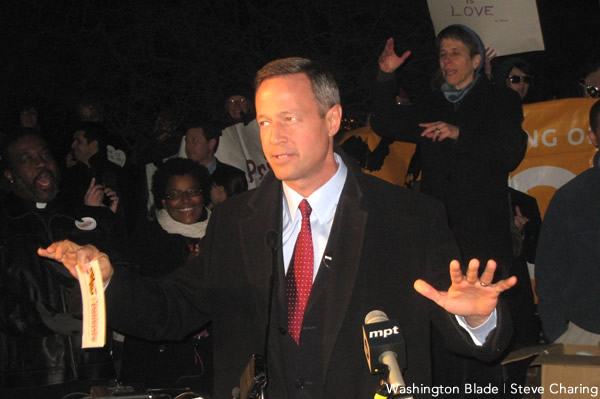Local
UPDATE: Md. braces for close vote on marriage
House committee advances bill; GOP lawmaker announces support


About 500 LGBT rights supporters turned out for the annual Lobby Day in Annapolis this week. For the first time, Gov. Martin O’Malley addressed the gathering. (Washington Blade photo by Steve Charing)
The Maryland House of Delegates is preparing for a close vote on a bill to legalize same-sex marriage on Friday.
The vote is expected just days after the measure was moved to the floor following approval by a joint committee on Tuesday.
Gov. Martin O’Malley introduced the Civil Marriage Protection Act as part of his legislative package. A similar measure passed the Senate but died in the House last year after supporters determined they didn’t have sufficient votes for passage in the lower chamber.
“Today’s vote on the Civil Marriage Protection Act is a significant step forward for the passage of this bill in Maryland,” O’Malley said in a statement after Tuesday’s committee vote. “Together, we will continue our work to ensure that our State protects religious freedom and provides equal protection under the law for all Marylanders.”
The Judiciary Committee and the Health & Government Operations Committee heard joint testimony last week on the marriage bill. The committees voted jointly over several hours late Tuesday afternoon. The vote was 25-18 in favor, with one abstention, Del. Sam Arora (D-Mont. Co.), a former supporter of the bill.
“We just took another step toward civil marriage equality becoming a reality in Maryland; the momentum is with us,” the group Marylanders for Marriage Equality said in a statement. “We thank all supportive Delegates for their leadership on this very important issue that will improve the lives of thousands of Maryland families and help put the state on the right side of history.”
Del. Kathleen Dumais (D-Montgomery County), who serves as vice chair of the Judiciary Committee, said the marriage bill was scheduled to be taken up on the House floor on Thursday for a second-reading vote following an informal first-reading of the bill on the floor on Wednesday. All bills are open to proposed amendments during the second reading. She said a final, third reading, debate and vote on the bill was expected to take place in the House on Friday.
“I feel positive that it will pass the House this year,” she told the Blade on Wednesday.
Although supporters hailed the joint vote by the two committees to approve legislation to legalize same-sex marriage, a breakdown of the vote shows that the bill lost among Judiciary Committee members by a vote of 11-10, with the one abstention by Arora. The vote breakdown shows that Health and Government Operations Committee members voted to approve the bill by a margin of 15-7, with one member absent.
The large margin of approval by the HGO Committee clearly put the bill over the top in the combined vote. The development confirms speculation that House Speaker Michael Busch (D-Anne Arundel County) gave the HGO Committee jurisdiction over the bill along with the Judiciary panel this year because he knew in advance that the Judiciary Committee lacked the votes to approve a marriage bill.
The Judiciary panel approved the bill last year by a one-vote margin, with Chairman Joseph Vallario (D-Calvert & Prince George’s County) voting for the bill. Vallario voted against the bill at Tuesday’s joint committee session. Arora also voted for the bill in committee last year but made it clear that he would not vote for it on the House floor.
His abstention this year highlights the surprise and disappointment among many LGBT activists in Maryland who supported Arora’s 2010 election campaign in which he ran on a platform of support for a same-sex marriage equality bill. Last year he initially signed on as a co-sponsor for the bill before he announced that based on religious beliefs he could no longer support the legislation.
No vote was taken in the joint committee session on a proposed constitutional amendment to ban same-sex marriage, but the joint panel voted down five proposed amendments to the Civil Marriage Protection Act, including:
• An amendment to eliminate all sex education in public schools, which failed 26-17;
• An amendment calling for parental consent before using materials that address “non-traditional families” in schools, which failed 27-16;
• An amendment to prohibit minors from marrying someone of the same sex, which failed 26-17;
• An amendment to change the effective date of the bill to Jan. 1, 2013, which failed 24-21;
• And an amendment to change the bill from marriage to civil unions, which failed 27-17.
In a related development, Del. Robert Costa, a Republican from Anne Arundel County, announced Tuesday that he will vote for the marriage bill.
“I think it’s not a state function to decide who can marry,” the Annapolis Capital quoted him as saying. “I do what I believe is right for people. I don’t think that matters. I represent constituents and not a party.”
The announcement drew quick praise from LGBT advocates.
“The fact that Del. Costa is going to support this bill publicly is really demonstrating the momentum for this and how quickly the momentum is growing,” Equality Maryland Executive Director Carrie Evans told the Blade. “It’s significant like Sen. Allan Kittleman’s vote was last year. We know it isn’t a partisan issue. We finally see evidence that it’s not. Del. Costa represents a fairly rural district and he’s with us.”
And in another development, a one-time supporter of the same-sex marriage bill who startled LGBT advocates last year by saying she was backing away from her support told the Blade that she has yet to decide how she will vote on the bill this year.
Del. Jill Carter (D-Baltimore) told the Blade last week that she’s concerned that some news media outlets incorrectly reported last year that she voted against the same-sex marriage bill in committee.
“In fact, I voted for it,” she said. “I’m not ready to say what I’ll do this year.” She voted for the bill in committee Tuesday.
Carter spoke to the Blade outside a House of Delegates hearing room in Annapolis on Feb. 10 in which two committees conducted a joint hearing on both the Civil Marriage Protection Act, which would allow same-sex couples to marry, and a separate bill calling for a state constitutional amendment to restrict marriage to a union only between a man and a woman.
Similar to last year, political pundits in the state believe the Maryland Senate is poised to pass the marriage bill and reject the proposed constitutional amendment.
But observers say the marriage bill’s prospects in the House of Delegates are uncertain. Supporters say they hope to persuade the small number of delegates that declined to back the bill last year and who are needed for the bill’s passage this year to change their minds and vote for it.
Virginia
Walkinshaw wins Democratic primary in Va. 11th Congressional District
Special election winner will succeed Gerry Connolly

On Saturday, Fairfax County Supervisor James Walkinshaw won the Democratic primary for the special election that will determine who will represent Virginia’s 11th Congressional District.
The special election is being held following the death of the late Congressman Gerry Connolly, who represented the district from 2008 until 2024, when he announced his retirement, and subsequently passed away from cancer in May.
Walkinshaw is not unknown to Virginia’s 11th District — he has served on the Fairfax County Board of Supervisors since 2020 and had served as Connolly’s chief of staff from 2009 to 2019. Before he passed away, Connolly had endorsed Walkinshaw to take his place, claiming that choosing Walkinshaw to be his chief of staff was “one of the best decisions I ever made.”
The Democratic nominee has run his campaign on mitigating Trump’s “dangerous” agenda of dismantling the federal bureaucracy, which in the district is a major issue as many of the district’s residents are federal employees and contractors.
“I’m honored and humbled to have earned the Democratic nomination for the district I’ve spent my career serving,” Walkinshaw said on X. “This victory was powered by neighbors, volunteers, and supporters who believe in protecting our democracy, defending our freedoms, and delivering for working families.”
In addition to protecting federal workers, Walkinshaw has a long list of progressive priorities — some of which include creating affordable housing, reducing gun violence, expanding immigrant protections, and “advancing equality for all” by adding sexual orientation and gender identity to the Fair Housing Act.
Various democratic PACs contributed more than $2 million to Walkinshaw’s ad campaigns, much of which touted his connection to Connolly.
Walkinshaw will face Republican Stewart Whitson in the special election in September, where he is the likely favorite to win.
Maryland
LGBTQ suicide prevention hotline option is going away. Here’s where else to go in Md.
Changes will take effect July 17

By ANNA RUBENSTEIN | The national suicide prevention hotline will no longer offer specialized support to LGBTQ people, starting July 17, the Trump administration announced last week.
Dialing the hotline at 988 will still be available for crisis support. But callers will no longer be able to reach specific LGBTQ services by pressing Option 3. The change worries advocates because their data shows the LGBTQ community has a disproportionally high suicide rate.
Even after the option ends, here’s how to receive tailored support if you’re in Maryland.
The rest of this article can be found on the Baltimore Banner’s website.
Maryland
Silver Spring holds annual Pride In The Plaza
‘Today means inclusion. It means to build resilience’

Silver Spring’s annual Pride in the Plaza event took place on Sunday to celebrate the LGBTQ community and emphasize inclusion and resilience.
“Today means inclusion. It means to build resilience, love,” Robyn Woods, program and outreach director for Live In Your Truth, which organized the event, said. “I mean, just being surrounded by the community and so many great entrepreneurs, business owners, and just being a part of this whole rainbow coalition that we call the LGBTQIA to be about.”
With the event being her first time organizing for Live In Your Truth, Woods said she felt emotional to see the support and love at the event.
“Some people (are) bringing out their children, their babies, their grandparents,” Woods said. “It’s a lot more allies here than anything else. That type of support to me means so much more than just support from my community; just outside support, inside support, so much support around it, so much love. Everyone’s smiling outside, helping each other.”
Attendees of the event were able to head over to the Family Fun Zone, an air-conditioned Pride Cool Down Lounge, or watch live drag performances in the main stage area.
Along with entertainment and a shaved-ice stand, rows of information tables stood along the plaza, including FreeState Justice, the Washington Spirit, Trans Maryland, Moco Pride Center, and the Heartwood Program, an organization that offers support, therapy, education, and resources to the LGBTQ community.
“I want people to know about our services, and I love what we have to offer,” Jessica Simon, psychotherapist for Heartwood Program’s Gender Wellness Clinic, said. “I (also) want to be part of a celebration with the community, and so it feels good to be here with other people who have something they want to give to the community.”
She added that within today’s political climate, to which she called an “antidote to shame,” it’s important to be celebrating Pride.
“There’s a lot of demonization of LGBTQI people,” Siena Iacuvazzi, facilitator for Maryland Trans Unity, said. “(Pride) is part of the healing process.”
Iacuvazzi said she was taught to be ashamed of who she was growing up, but being a part of a community helped her flourish in the future.
“I was taught how to hate myself. I was taught that I was an abomination to God,” she said. “But being a community is like understanding that there are people who have experienced the same thing, and they’re flourishing. They’re flourishing because they’re willing to stand up for themselves as human beings and discover themselves and understand what’s true for themselves.”
She added that Pride allows for a mutual understanding to take place.
“It’s more of a sense of belonging … and just taking that home and understanding you’re not alone,” Iacuvazzi said. “We’re each taking our own journey — we’re not putting that on each other. It’s just walking away with a sense of belonging and humanity.”
Similar to Iacuvazzi, Woods said she hopes attendees’ biggest takeaways would be family, fun, resilience, and pride.
“Being proud of yourself, being happy for who you are, and representation and how much it matters,” she continued. “And I think all these young people that are walking around here get to see versions of themselves, but older. They get to see so many different lesbian, gay, bisexual, pansexual people that are successful, that are showing love, that care, and it’s not how we’re portrayed in the media. It’s lovely to see it out here. (It’s) like we’re one big old, happy family.”
-

 U.S. Supreme Court4 days ago
U.S. Supreme Court4 days agoSupreme Court upholds ACA rule that makes PrEP, other preventative care free
-

 U.S. Supreme Court5 days ago
U.S. Supreme Court5 days agoSupreme Court rules parents must have option to opt children out of LGBTQ-specific lessons
-

 Television5 days ago
Television5 days ago‘White Lotus,’ ‘Severance,’ ‘Andor’ lead Dorian TV Awards noms
-

 Music & Concerts5 days ago
Music & Concerts5 days agoBerkshire Choral to commemorate Matthew Shepard’s life











